Jupiter Ascending was one of those movies that seemed to come out of nowhere. Its plot was thin on logic at times, and its scenery chewing was a marvel to behold. The film was pure space opera in an era that doesn’t often do space operas unless they are known quantities. It was a genre film with no franchise to back up or reboot. It confused and annoyed a lot of people.
But for some, it was the Holy Grail of everything they ever wanted in a movie and hadn’t known to ask for.
Jupiter Ascending only suffers from one true problem in my humble opinion: it should have been created as a trilogy, or at least two films, to cover all the material in it. While watching, you get the sense that the Wachowskis understand the logic of this universe, that they’ve got the backstories and details to pull the whole thing together, but the audience only ever glimpses that narrative. Sometimes that works in genre film–there are plenty of movies that do the bare minimum on the world building front and still work out, often because the story being told is simple enough to ignore the bigger questions provoked by its premise. Even Star Wars got away with that at its inception.
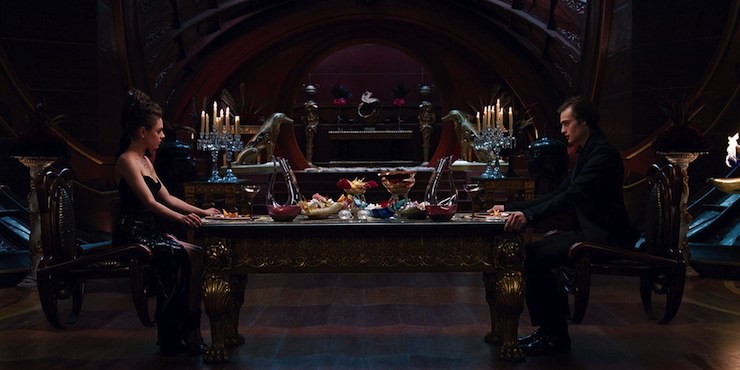
Jupiter Ascending is not that movie.
The film has an intricate backlog of intrigue and politics that the audience is only getting base level access to. There is an entire universe of commerce and class systems that we have no context for, and while the shorthand is interesting, it opens up far too many questions to satisfy. Human being can be spliced with animals? Any kind of animal? How many animals? Are they all ones that we’d know? What about the people spliced with cyborgs? Where do they fit in class-wise, and were they always cyborg-y? Are they actually androids with no real human parts? How did the turn-people-to-serum-for-youth business start and/or get discovered in the first place? The Abrasax family appears to have power, but not to be directly in charge, so what kind of government body is? Are there citizens of this universe who take exception to human splicing with animals genes for the purpose of labor and military use? Where are they?
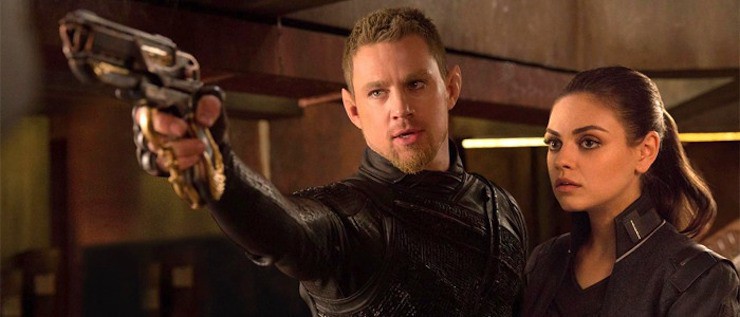
These are only a small fraction of the questions I had the first time I watched. And to be fair, the fact that the film prompted so any questions still means that the Wachowskis developed a wonderfully complex world that I’d be happy to spend more time in–and many fans of the film clearly felt the same. It’s just a shame that it rendered the film too muddy to prompt more advocates to its cause.
Of course, some of the questions I had were less flattering to the premise, like, what the heck happens to Stinger’s daughter after he rockets away, and who the heck is Jupiter’s buddy Katharine Dunlevy exactly and did they literally become friends because Jupiter cleans her house because that seems relevant, also, why does looking identical to the Abrasax matriarch make Jupiter owner of the Earth, but not anything else the woman had control over before her death? These are things that it would be extremely helpful to know.

The two main inspirations for the story were the Odyssey and The Wizard of Oz, with Odyssey being more of the spiritual predecessor and Oz being the practical one; the Wachowskis liked the idea of bringing the typical portal fantasy heroine, like Alice or Dorothy Gale, into a space opera setting. (Yes, that does mean that Caine was patterned after Toto. No, I’m not kidding–the Wachowskis said so. Let that one settle in your brain for a minute.) The idea was to flip the trope of the “stock space hero” who is stoic and tough with a woman who negotiates her way through trouble with empathy and smarts. To be fair, Jupiter doesn’t always manage this–her near-marriage to Titus Abrasax Smarmy McShirtless Artful-Poutface, Lord of Orgy Grove, is by far her dimmest move in the narrative, especially seeing as there is no way to look at Titus without every single creep meter going off in your brain, unless you actually think guys like, oh, Dorian Gray are just misunderstood woobies in need of a helping hand. (Seriously, has Douglas Booth ever played Gray? He should.)
But while moves like that don’t really work in a narrative sense, they do work to make Jupiter a more endearing hero. The tale sets her up as a perpetual doormat in a manner that is deeply distressing–to the point where she is willing to sell her eggs to make cash (to buy a telescope like the one that belonged to her dead father), but give her cousin two-thirds of the money… presumably because the whole thing was his idea? He makes some comment about capitalism when she asks why he should get such a large cut, but it doesn’t really play, so we have to assume that Jupiter is just letting him walk all over her because that’s how she is. Throughout the story, Jupiter gains more and more determination and will to fight back–a consequence of her choices now determining the future of humanity rather than just her own. It provides more motivation for her transformation into a heroic figure than your average origin story, and is more interesting for how Jupiter tries (and sometimes fails) to navigate the impossibility of the situation. It makes her story feel more real.
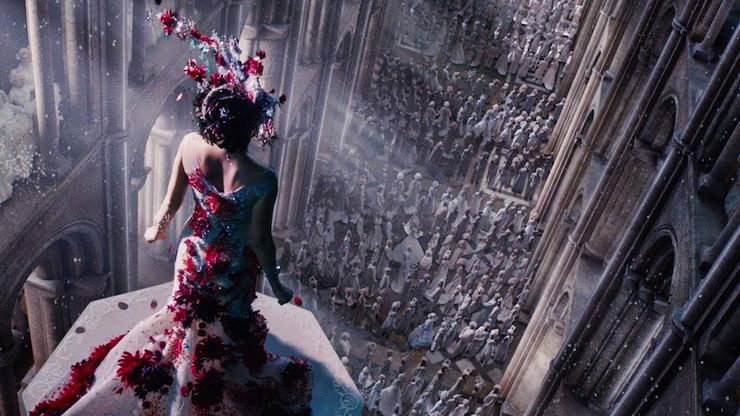
There is an element of wish fulfillment to the film that many female critics latched onto–a hero’s story, but with specific touches that make it clear who the target audience is meant to be. Jupiter lives a life that seems inconsequential to her, then has a universe of possibilities open up in front of her. Her journey requires an acceptance of nobility, changing in and out of incredible outfits, proposals of marriage, harrowing chase sequences, and a hunky guy who attaches himself to her side from the moment they lock eyes. It’s better than a princess narrative because it’s not about being whisked away to a castle, never to toil or worry again–in fact, the narrative is basically the opposite of that in every way–and hits beats for its female audience that are often looked down upon by action films. And because Jupiter has her beginnings as a character who is accustomed to getting steamrollered, she retains a certain level of awkwardness that your average viewer can empathize with; when Caine tells her that he basically has more in common with a dog than a human, and Jupiter blurts out “I love dogs, I’ve always loved dogs,” it’s impossible not to wince and laugh at the same time. Even she knows it was a ridiculous thing to say.
I read reviews of the film before I saw it the first time, and wondered whether this approach was going to work for me, only to have it confirmed by the character of Caine Wise. Suffice it to say, Channing Tatum is really not my usual type when it comes to men. Yet in this film? He totally works for me. Cannot explain it. (They said that he had to wear some kind mouthpiece to give his jaw a more canine-type shape? Maybe that’s part of it? Apparently it was really irritating for the poor guy to wear.) It might be the near-werewolf thing they’ve got going on? Then again, it might just be how successfully he broods and growls and stalks around through the whole ordeal, only to make sad, sad puppy eyes every time he looks at Jupiter. It just does the job.
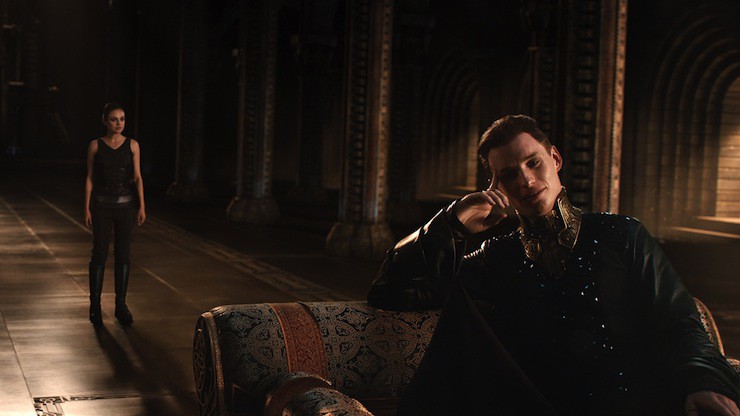
Also, can all villains be Balem Abraxas? Eddie Redmayne won a Golden Raspberry Award for Worst Actor in a Supporting Role for this part, and I can only guess that it’s because people don’t understand true mastery when they see it. Eddie Redmayne won an Oscar for playing Stephen Hawking the very same year, which is great, I guess, but Hawking is a real life person, someone that Redmayne had the ability to research and study and engage with. (I have specific opinions on actors usually getting awards for playing real people in biopics anyhow, but that’s a discussion for another time.) Balem Abraxas came out of his brain, everyone. No one told him he had to do what he did–though I presume that he worked with the Wachowskis on building the character to a certain degree–he just did it. Of course the character is over the top, because how could a character like Balem Abraxas not be an aggrandizing mess muppet? If we had gotten a performance any less overwrought than this, I promise you that the entire movie would have fallen apart.
There is an attention to the female body and female roles in this film that cannot be understated, and I can’t help but wonder if this awareness or focus comes as a result of the Wachowskis’s transitions. Jupiter agrees to sell her eggs in a deal where her cousin gets the primary benefits and undergoes none of the risks. He continually tells her that this operation is no big deal, though he isn’t the one who has to go through it–and ends up spending his share on a video game system and large television. In that respect, the film does an excellent job of showing the ways in which women’s bodies are used and commodified without resorting to a rape or sex work narrative (a tack that is obviously far more common). Cousin Vladie has no way of making this money on his own, or would simply rather not do that work in the first place–as cousin Moltka later bemoans, he has treated his cousin “like chicken.” Like an asset and object rather than a person.

There are other cues as well–for example, when Jupiter finds that Caine has been injured in their escape from Balem Abrasax’s agents, she ends up trying to staunch the blood with a maxi-pad. (Though she seems to do this by pressing down on the wound with the adhesive side, a goof that is patently hilarious to witness.) Caine shows brief discomfort over the idea, but Jupiter insists, refusing to let an acknowledgement of the fact that women menstruate get in the way of administering first aid.
And of course, there is the oddness of Jupiter looking exactly like the deceased Abrasax matriarch, then encountering all three of the woman’s children, who proceed to handle her with various levels of attraction and disdain. Kalique is the first, who tries to tempt Jupiter with the allure of everlasting life through their serum, in a show that is decidedly sensual in nature. Titus offers to help Jupiter through marriage, though the kind that he pegs as more of a business transaction, and is later revealed to be a liar. But though the first Abrasax siblings show little care for boundaries when faced with someone who looks just like the woman who raised them, it is the Jupiter’s encounter with Balem that strikes the most disturbing note. She divines that Balem was the one to kill his mother, and though he continually insists that he knows the different, it is clear that Balem is projecting his mother onto Jupiter. The final fight turns personal, with Jupiter trying to protect her own family as Balem comes after her, and in the end, she dispatches him with the words “I am not your mother.” In effect, she rejects the maternal mantle that Balem desperately wants to place on her; though he is revealed to have killed his mother, he says at the beginning of the film that he misses her because she was the only person who “truly understood” him.
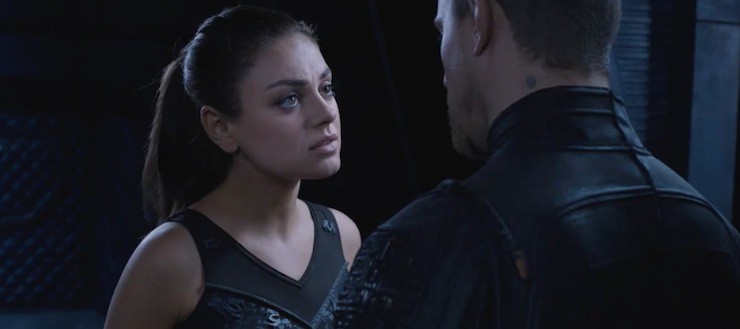
This is more fascinating for the fact that Jupiter, as a female protagonist, is allowed to be and feel explicitly sexual without being maligned for it. Her attraction toward Caine is romantic and sexual in nature, and that desire is addressed and played up for the benefit of the viewer, without making her out to be overly promiscuous or “bad.” Addressing female desire within a narrative is something that Hollywood films often still struggle with–they’ve come to realize that woman will sit in the audience to watch an attractive man, but they often won’t allow a woman on screen to show that same desire candidly if she’s meant to be a hero. Desire and sexuality is still mostly the purview of “evil” women in fiction.
One point in the story where many fans have cited a play on trans issues comes when Jupiter arrives on Ores, the capital planet, in order to claim her inheritance as owner of Earth. While it can be read as an indictment of government bureaucracy, it seems more to be a particularly sharp commentary on the difficulty that trans people often have in changing their IDs and paperwork to reflect their chosen name. (After all, Jupiter is obtaining “a title.”) Pointedly, it might be the funniest section in the entire film. Jupiter is assigned a helper named “Intergalactic Advocate Bob,” and proceeds to pass through countless different offices, fills out a myriad of confusing forms, and gets told time and again that she doesn’t have the information needed to continue. The whole thing is eventually revealed to be a giant catch-22 that can only be solved with the application of bribery, and then, finally, they arrive at an office run by Terry Gilliam. Gilliam, as Seal and Signet Minister, proceeds to homage his own film Brazil in a brilliant little scene that finally ends with Jupiter receiving her title, and says “Well, congratulations, your Majesty. And my deepest condolences.” As a commentary on the real life struggles of trans people, it doesn’t get more entertainingly on the nose than that.
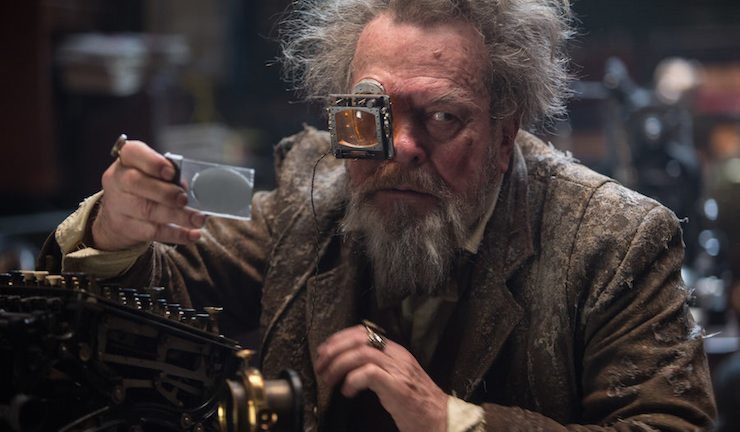
But the thing that really makes this film work for me is the use of “time economy.” (It’s another indictment of capitalism, really, much like Speed Racer was.) The story reveals to us that the only true currency in the universe is time. People will murder countless beings on faraway planets and drink whatever’s left over of them in order to gain more time in the universe. It’s a common trope in science fiction that often zeroes in on the aspect of beauty–people want everlasting life because they want the ability to stay hot forever. But while that idea is briefly entertained in Jupiter Ascending, this economy has far more to do with the ability to stick around indefinitely, to have freedom to do as one pleases always and infinite days to enjoy that freedom. The first time I watched the film, that idea hit hard–because while this has always been true after a fashion, we are heading further down that road now in ways that we barely quantify on a day-to-day basis.
I’m not talking about plastic surgery or the potential to cryogenically freeze our heads until we can survive in the future. I am talking about the ways in which we are constantly paying out to free up more of our time: Should I put up these shelves myself and learn a new skill, or should I pay someone to do it for me? More often than not, it’s all about whether or not you have the time.
Do I have the ability to pick up that birthday gift today, or should I pay through an app to have someone grab it for me so I can get all my other errands done? Time.
Trek though the shopping mall for hours, or have that thing delivered in two days via Amazon Prime? Time.
Think up my own ideas for meals and plan out what food I have to buy, or let a service pick out the exact items I need, and deliver it in a kit complete with recipe. Time. It’s all time. People who have more wealth can afford to spend less time on draining activities, and more on what they love because we live in a world where, more than ever before, money buys you time.
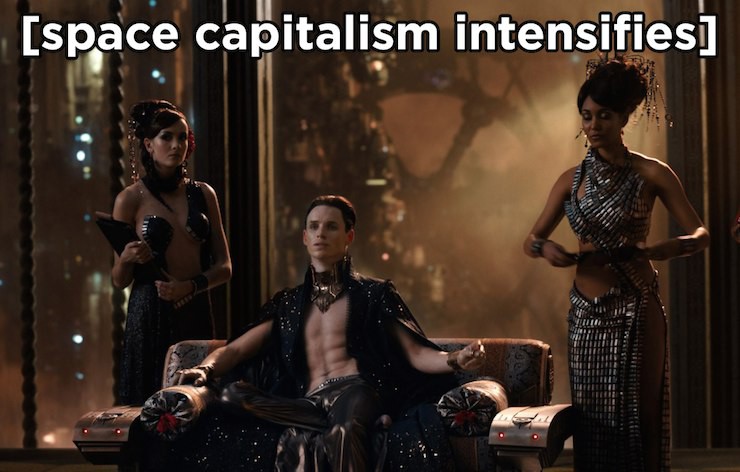
The fact that this is at the heart of Jupiter Ascending speaks to everything that the Wachowskis do brilliantly. This movie is silly and strange and incredibly shot and oddly innovative, and the core of the narrative revolves around something very real and very frightening that we all need to pay more attention to in the future.
And then it ends with the owner of the Earth (happily returned to her family and newly pleased with her lot in life, after having a frightening wealth of responsibility dumped into her lap) hanging out with her humanoid boyfriend on hover blades, on the very best date ever. Because whatever our future holds, the connections built on love and trust are the only ones that will keep us afloat. This theme every single time, in every single tale the tell. Because however dark their stories get, the Wachowskis clearly have hope, and they hold that above all. Against the backdrop that is the constant destruction wrecked by blockbuster films, that is perhaps the most gratifying thing to see.
[space capitalism intensifies] pic via the Jupiter Ascending Appreciation Tumblr
Emmet Asher-Perrin plans to speak like Balem Abrasax for the rest of the day, and no one can stop her. You can bug her on Twitter and Tumblr, and read more of her work here and elsewhere.










